#nairobi
Explore tagged Tumblr posts
Text
Aldo Fallai
Nascido em Florença em 1943, Aldo Fallai vive e trabalha em sua cidade natal e em Milão. Após se formar no Istituto d'Arte de Florença, onde posteriormente lecionou, abriu um estúdio de design gráfico com o fotógrafo Mario Strippini e começou a se aproximar da fotografia. Em meados da década de 1970, conheceu Giorgio Armani, que estreava como designer no início da afirmação global do Made in Italy, para o qual a fotografia de Fallai contribuiu significativamente. Seu primeiro trabalho com Armani marcou o início de uma colaboração que durou quase trinta anos.
Ele publicou os livros de fotografia: "Quase Um Ano" (1993), "In Fabbrica" (2007) e "De Giorgio Armani ao Renascimento" (2014).

Aldo Fallai - Nairobi 1980
153 notes
·
View notes
Text

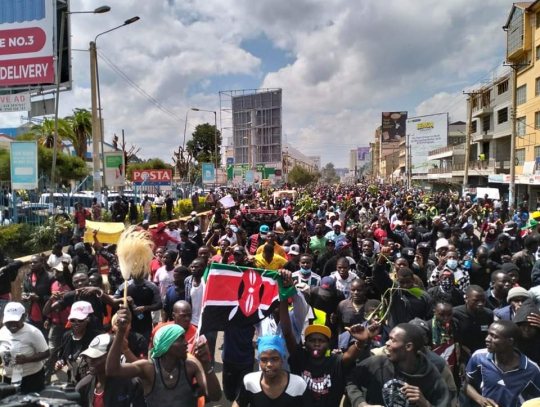
Massive protests against the 2024 Finance Bill continue in Nairobi and across Kenya. Parliament has been stormed, and City Hall set on fire.
The bill imposes taxes that will further impoverish those already suffering from the increasing cost of living. The government even tried to put a tax on bread and cooking oil, but this was apparently withdrawn. The International Monetary Fund is putting pressure on president Ruto to impose austerity measures and raise taxes.

Supreme Court staff and lawyers helping demonstrators with water.
Some protestors have been shot, with fatalities. The police have apparently arrested a number of paramedics trying to treat the wounded.
Homes of several MPs who support the finance bill have been looted and set ablaze. I have no sympathy.
A protestor stated:
“We are the flames burning up the country. We cannot stand still while we are robbed and made poor. “This movement will not stop until we have won. They can kill us but they can’t beat down our movement.”
3K notes
·
View notes
Text




ೃ⁀➷ scarface ˗ˏˋ꒰ 🦢 ꒱
╰┈➤ berlin x hostage!reader imagine
a/n: i would like to give a special thank you to @lumillsie for the layout of this post and for the filter used on the header!

˚ ༘♡ “i’m afraid you comrades have become our hostages.”
˚ ༘♡ you couldn’t see the man speaking, none of you could. the blindfold pressed against your face, blocking the light that shone through the polished windows, just as the criminals had blocked every avenue of escape. you stood no different to the others lined up alongside you, all you could do was listen. the nervous shuffling of feet, muffled sobs, and the erratic breathing of strangers filled the air, feeding your already frayed nerves. the tension was suffocating, tightening around your chest like an iron grip.
˚ ༘♡ you were not supposed to be here. as an executive assistant for the korean mint, your job revolved around order, organizing reports, managing schedules, ensuring things ran smoothly. yet none of that prepared you for this chaos. the only reason you were here at this godforsaken hour was because the sleazy director had called you back after your shift ended. under the pretense of a scheduling issue, he had summoned you to his office, but his leering gaze and thinly veiled intentions made you regret not making an excuse to stay home. now, that regret burned even brighter, a pang of apprehension wretched in your stomach.
˚ ༘♡ the voice came again, stony and slicing through the panicked murmurs of the hostages. heavy footsteps echoed in the vast room, measured and unhurried, each step landing with intent. your pulse quickened. the sound grew closer, louder, more oppressive, until it felt as if it would stop directly in front of you. and to your fright, it did.
˚ ༘♡ a hand reached out, rough and sure, grasping your face. it wasn’t harsh enough to hurt, but there was no tenderness in it either, only control. your breath grew unstable as you felt the blindfold torn away, the fabric scraping against your skin. the sudden exposure to light stung your eyes, but you didn’t dare look up. fear rooted you in place, your gaze fixed on the ground as your hands trembled at your sides.
˚ ༘♡ “look up.” the voice was deep, mocking, the hint of a smirk woven into the thick north korean accent. the command wasn’t shouted, but it didn’t need to be. its weight was undeniable, pressing down on you like a hand on your throat. trembling, you hesitated, your fear begging you to keep staring at the floor.
˚ ༘♡ “i said, look up.” this time, there was steel in his tone, and the words struck like a whip. your body betrayed you before your mind could argue. slowly, reluctantly, you lifted your gaze.
˚ ༘♡ and that’s when you saw him.
˚ ༘♡ a man stood before you, perhaps in his late thirties or early forties. his features were pointed and unyielding, his sun-tanned skin stretched over high cheekbones and a jaw that clenched with latent superiority. his dark hair was slicked back, further emphasizing the austerity of his appearance. he did not wear a hahoe mask like the others. you could see his face clearly, and that fact alone sent a frigid sensation of fear through your veins. there was only one conclusion to draw from this, you would not leave here alive. no one could see a criminal’s face and live to tell the tale.
˚ ༘♡ “hmm.” his voice was quiet as he pondered what was on his mind, the sound of it drawing your breath to a halt. he leaned in, his piercing gaze narrowing as it swept over your face, studying you with disturbing focus. your chest rose and fell in rapid succession, struggling to expel the air caught in your lungs.
˚ ༘♡ “take a deep breath, would you?” his words were deceptively calm, but there was an authority in them you dared not defy.
˚ ༘♡ your hands trembled as you tried to obey, forcing an unstable inhale that did little to steady your racing heart. his eyes landed on your wool coat, where your phone protruded in the pocket. before you could react, he extended his hand.
˚ ༘♡ “give it to me.”
˚ ༘♡ hesitantly, you reached into your coat, stiff with fear, and handed the device to him. the instant it left your grasp, he tossed it to the ground. the sound of the screen shattering against the cold floor jolted you, but what came next made your stomach drop. with one swift motion, he raised his boot and brought it down, crushing the phone into a pile of broken glass and metal.
˚ ༘♡ you gasped aloud, stepping back as your limbs threatened to give out. your lips parted in shock, but he remained unfazed, standing there as if nothing had happened.
˚ ༘♡ “i’m berlin,” he introduced himself, his tone harsh and taunting. his gaze didn’t move as he continued, his voice softening into a contemplative murmur. “and you… you’re the daughter of the korean defense minister, aren’t you?”
˚ ༘♡ his words slashed through the sinister atmosphere, leaving you motionless where you stood.
˚ ༘♡ “i recognize your face now.” his lips twisted into a bemused grin. “tell me, why is the daughter of a wealthy minister working as a lackey in the mint?”
˚ ༘♡ you couldn’t answer. your voice, if it even existed, was trapped somewhere between fear and disbelief. your eyes darted down to the shattered remains of your phone, then back up to meet his unyielding gaze. the glass fragments seemed to glint like shards of your own hope scattered across the floor.
˚ ༘♡ what he said was true. you were the eldest daughter of the defense minister, a man appointed to his position after the unification of korea. your father, once a prominent figure in the south korean national assembly, had earned his power and influence through a career focused on military affairs. but none of that mattered now. the consequence of that identity, the very thing you had tried so hard to keep hidden, was now fully exposed.
˚ ༘♡ berlin turned away from you with an air of satisfaction, as though he had uncovered some magnificent treasure. “how lucky are we, huh, denver?” he said, addressing one of the masked criminals in a red jumpsuit. his tone was darkly delighted, dripping with smug arrogance. “the daughter of such a prominent figure, right here, as our hostage.”
˚ ༘♡ “sir…” you finally managed to stammer, your voice weak. every fiber of your being told you that begging or pleading would be futile, this heist was too carefully planned, too calculated for something as pitiful as that to persuade them. yet, despite the tremor in your voice, you forced the words out. “if… if i could just know the reason behind your mission.”
˚ ༘♡ he sneered at your question, his lip curling as if amused by your naïveté. “that,” he said coldly, his tone sharp enough to slice through you, “is none of your concern.” he stepped closer, and you instinctively leaned back, though there was nowhere to go. “don’t waste my time with stupid questions. it will do you no good.”
˚ ༘♡ before you could retreat further, his hand reached out, firm fingers tilting your chin upward. his dark eyes bore into yours with an intensity that made your pulse thunder in your ears. his touch was ice-cold, akin to winter frost against your skin, and it sent an involuntary shiver down your spine.
˚ ༘♡ “moscow,” he barked, not breaking his gaze from yours, “head upstairs and inform the professor of our… fortunate discovery. i think he’ll find it rather interesting.”
˚ ༘♡ a stout man, dressed identically to the rest of the criminals, gave a nod and slung his rifle over his shoulder. without a word, he ascended the staircase, his laced boots thudding against the metal steps.
˚ ༘♡ you glanced around, your fear morphing into panic as your gaze drifted over the rest of the room. your co-workers from the mint, along with the high school students from the field trip, were still lined up, trembling and blindfolded. their muffled whimpers and shaky breathing filled the space like a grim symphony.
˚ ༘♡ but berlin’s attention was locked solely on you. “you,” he said, his voice dropping to something inexplicable, perhaps intimate, yet no less dangerous, “don’t belong here with the rest of the hostages, do you? no, you’re quite special.”
˚ ༘♡ his grip constructed around your arm suddenly, rough enough to make you wince. “rio, tokyo,” he barked, not sparing a glance at the others. “get the rest of the hostages dressed and armed. i’ll handle our guest here.”
˚ ༘♡ two figures stepped forward from the line of criminals. the younger man, who you assumed was rio, removed his mask without reluctance and began moving to obey berlin’s orders. his expression was subdued, almost resigned, as though this were routine. the woman, tokyo, followed suit, her softer features contorting into a glare she didn’t bother to hide from berlin. though she clearly didn’t agree, she complied without protest.
˚ ༘♡ before you could process what was happening, berlin began dragging you toward the stairs. his grip was unrelenting, and you stumbled to keep pace. the acrid scent of cigarette smoke clung to his breath, filling your senses and heightening your unease.
˚ ༘♡ as you were pulled upstairs, you glanced over your shoulder. the rest of the hostages were being herded like sheep, their blindfolds removed and their devices confiscated. there was an air of chaos and helplessness, but the criminals operated with a cold precision that made it all the more horrifying.
˚ ༘♡ you knew he had ordered you not to speak, but the aching concern for your colleagues at the mint outweighed your better judgment. you forced the words out, your voice barely above a whisper, “sir, what will happen to the others?”
˚ ༘♡ his reaction was instant, cruel and unforgiving. “enough with the questions. are you deaf?” his tone was laced with irritation, his hand tightening on your arm as he halted at the top of the stairs. his free hand moved briskly to rest on the rifle slung across his chest, an action that sent your pulse into overdrive. “as long as they do as they’re told,” he said coldly, his eyes flicking down to meet yours, “they’ll live.”
˚ ༘♡ the intent behind his words sank solemnly in your chest, but they provided little comfort. what did doing as they’re told mean? what did that entail? you didn’t dare ask for clarification. fear had locked your throat shut.
˚ ༘♡ at the end of the hallway, he forced you into a conference room. it was meant to be a professional space, a place for meetings, discussions, plans, but now it felt like a suffocating cage. berlin shoved you forward with a careless force that sent you stumbling to the floor. the tawny carpet felt rough beneath your hands, and as you tried to gather yourself, you realized your legs wouldn’t stop shaking. you were trembling so violently that getting back up seemed impossible.
˚ ༘♡ he stood over you, shaking his head with a theatrical sigh, his expression twisted into something resembling mock pity. “get up,” he ordered, his voice ridden with feigned concern. “it’s a pathetic sight. if i wanted to kill you, don’t you think i’d have done it by now?”
˚ ༘♡ yet even his attempt to rationalize your survival did nothing to soothe your frayed nerves. when you didn’t rise fast enough, he moved toward you, his impatience evident. before you could brace yourself, his hands gripped your waist, hauling you to your feet with little regard for your pitiful form.
˚ ༘♡ “relax, damn it!” he lashed out, though there was no softness in the demand. his hands lingered a second too long before he let go, stepping back. “you’ve got the easy end of this,” he continued, nodding toward the door. “out there? they’re the ones who’ll do the hard labor. you? you get to stay here, comfortably out of the way.”
˚ ༘♡ your eyes widened, the tears you’d been holding back streaking down your pallid cheeks. you couldn’t stop yourself from inquiring, the words escaping your mouth negligently. “but why… why do i need to stay here?”
˚ ༘♡ his lips curved into a faint, sardonic smile, as though your confusion entertained him. “another question,” he droned, his tone coarsely indulgent. “but i’ll allow it, i was going to tell you anyway.”
˚ ༘♡ he stepped closer, the austerity of his presence bearing down on you. “the police will come,” he began, his voice calm but charged with menace. “it’s only a matter of time. they’ll gather intel on the crisis, and they’ll try to ruin everything for us, storm the building, act recklessly.” he paused, his dark eyes boring into yours. “but they won’t. not when they know we have the minister of defense’s daughter in our grasp.”
˚ ༘♡ the reveal of the grand scheme hit you like a blow, leaving you breathless. you stared up at him, horrified, as the full reality of your situation sank in. you weren’t merely a hostage, you were leverage, a bargaining chip, a pawn in their game. and there was no escaping it.
˚ ༘♡ “i already know what you’re going to say,” berlin said, his voice deadly quiet, yet every word seemed to reverberate in the air around you. his finger grazed your cheekbone, the touch sedated and delicate, as if savoring the terror etched across your face. the lightest brush of his skin against yours was enough to send a shudder through your body. his hand continued its path, stopping just at the curve of your rosy lips, his dark eyes watching your every reaction with a formidable pleasure.
˚ ༘♡ “and if the police don’t heed your father’s words?” he murmured, tilting his head slightly as though contemplating the question himself. his finger hovered over your lips, lingering just long enough to make you careen in your stance. “then that pretty face of yours won’t see another day.”
˚ ༘♡ there was a chilling contradiction in his expression, brutality melded with a macabre thrill, as if he relished the power he held over you and everyone else. it was distressing in its intensity, and you couldn’t tear your gaze away, no matter how much you wanted to.
˚ ༘♡ he pulled back slightly, his tone shifting into something almost casual, as though he hadn’t delivered a forthcoming death threat. “if the police act accordingly, it won’t have to come to that,” he said, his tone smooth and reassuring. “you’ll leave here unscathed, so don’t worry too much.”
˚ ༘♡ he smirked then, the expression devoid of true sincerity but brimming with confidence. “i’m willing to believe your dear father will do everything in his power to ensure his precious daughter’s safety. a man like him doesn’t let something like you go to waste. he would heaven and earth for you, wouldn’t he?”
˚ ༘♡ your politician father’s influence, his position, his wealth, it had all painted a target on your back. now, you were nothing more than power in their hands, a negotiation tool that could either save or destroy you. and berlin appeared to revel in the knowledge of it.

a/n: a money heist korea fanfiction for berlin! let me know if you have anymore requests for him as well as your thoughts! 🤍

#money heist korea#money heist#money heist: korea#money heist fanfiction#money heist berlin#money heist fanfic#money heist fic#money heist x reader#money heist imagine#money heist professor#money heist tokyo#berlin#rio#denver#tokyo#moscow#nairobi#helsinki#oslo#mi seon#berlin fanfiction#berlin x reader#berlin x female reader#berlin x you#berlin x y/n#park haesoo#park hae soo#la casa de papel#berlin fanfic#money heist korea berlin
413 notes
·
View notes
Text
Girafe Manor hotel, Lang'ata, Nairobi, Kenya: The main feature of Girafe Manor hotel in Kenya is the opportunity to have breakfast in the company of giraffes that come to the windows of the rooms... Giraffe Manor is a hotel in the Lang'ata suburb of Nairobi, Kenya which, together with its associated Giraffe Centre, serves as a home to a number of endangered Rothschild's giraffes, and operates a breeding programme to reintroduce breeding pairs back into the wild to secure the future of the subspecies. Wikipedia
309 notes
·
View notes
Text
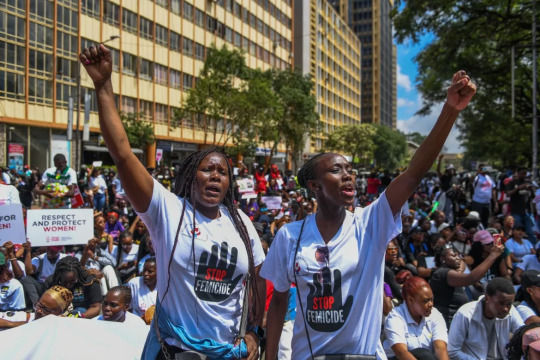
Thousands protest against increasing violence against women in Kenya as they march to the parliamentary building and supreme court in the capital Nairobi [Gerald Anderson/Anadolu Agency]
Published On 27 Jan 202427 Jan 2024
Thousands of people have gathered to protest in cities and towns in Kenya against the recent slayings of more than a dozen women.
The anti-femicide demonstration on Saturday was the largest event ever held in the country against sexual and gender-based violence.
In the capital, Nairobi, protesters wore T-shirts printed with the names of women who became homicide victims this month. The crowd, composed mostly of women, brought traffic to a standstill.
“Stop killing us!” the demonstrators shouted as they waved signs with messages such as “There is no justification to kill women.”
The crowd in Nairobi was hostile to attempts by the parliamentary representative for women, Esther Passaris, to address them. Accusing Passaris of remaining silent during the latest wave of killings, protesters shouted her down with chants of “Where were you?” and “Go home!”
“A country is judged by not how well it treats its rich people, but how well it takes care of the weak and vulnerable,” said Law Society of Kenya President Eric Theuri, who was among the demonstrators.
Kenyan media outlets have reported the slayings of at least 14 women since the start of the year, according to Patricia Andago, a data journalist at media and research firm Odipo Dev who also took part in the march.
Odipo Dev reported this week that news accounts showed at least 500 women were killed in acts of femicide from January 2016 to December 2023. Many more cases go unreported, Andago said.
Two cases that gripped Kenya this month involved two women who were killed at Airbnb accommodations. The second victim was a university student who was dismembered and decapitated after she reportedly was kidnapped for ransom.
Theuri said cases of gender-based violence take too long to be heard in Kenyan court, which he thinks emboldens perpetrators to commit crimes against women.
“As we speak right now, we have a shortage of about 100 judges. We have a shortage of 200 magistrates and adjudicators, and so that means that the wheel of justice grinds slowly as a result of inadequate provisions of resources,” he said.
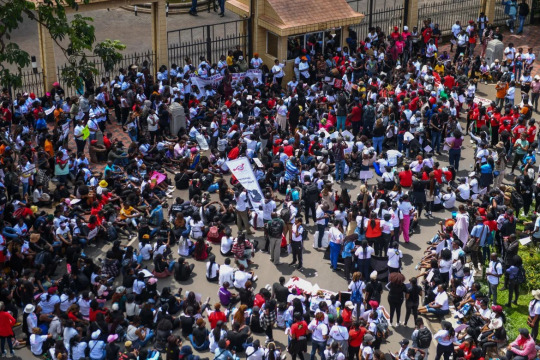
People gather to protest in an anti-femicide demonstration, the largest event of its kind ever held in Kenya. [Gerald Anderson/Anadolu Agency]
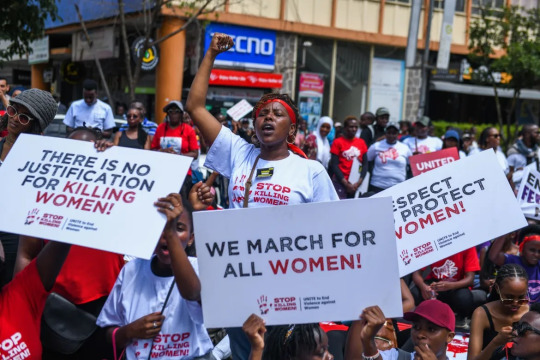
Kenyan media outlets have reported the slayings of at least 14 women since the start of the year. [Gerald Anderson/Anadolu Agency]
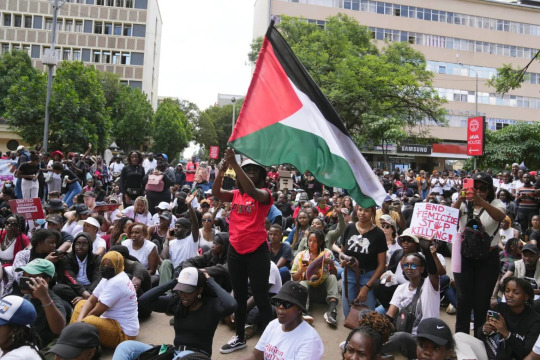
A protester holds a Palestinian flag during a march to protest against the rising cases of femicide, in downtown Nairobi. [Brian Inganga/AP Photo]
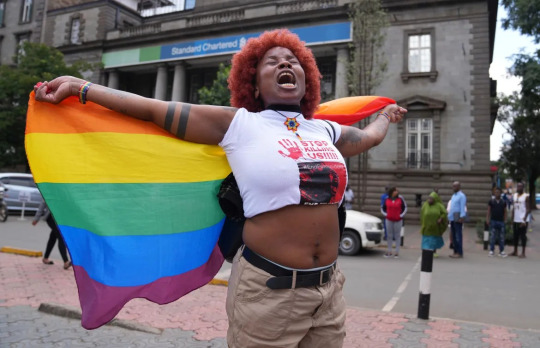
Women and feminists in Kenya took to the streets to march against the rising cases of femicide. [Brian Inganga/AP Photo]

In Nairobi, protesters wore T-shirts printed with the names of women who became homicide victims this month. [Gerald Anderson/Anadolu Agency]
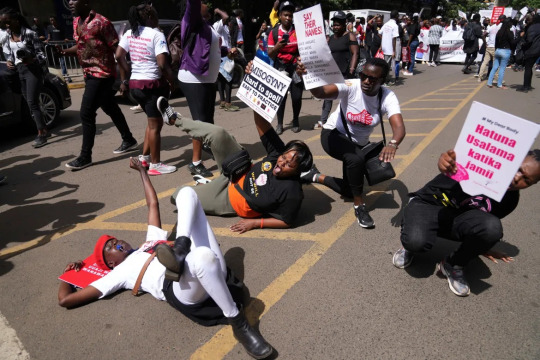
Protesters react against the rising cases of femicide. [Brian Inganga/AP Photo]
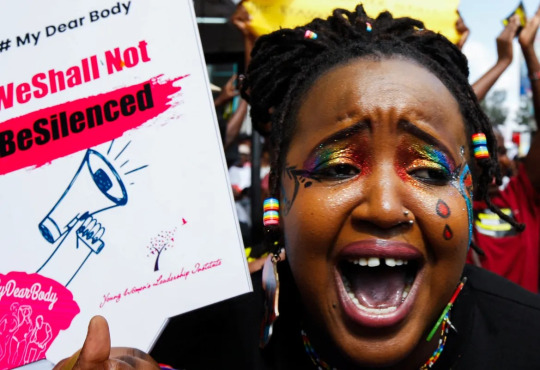
A human rights activist reacts as she attends a protest demanding an end to femicide in the country. [Monicah Mwangi/Reuters]

Protesters gather during the anti-femicide demonstration. [Gerald Anderson/Anadolu Agency]

The crowd, composed mostly of women, brought traffic to a standstill. [Gerald Anderson/Anadolu Agency]
#Kenya#Femicide#Nairobi#There is no justification to kill women#The court systems taking too long to hold perpetrators accountable#The power of women standing together#Please reblog#Western media isn't going to give this the coverage this deserves
2K notes
·
View notes
Text
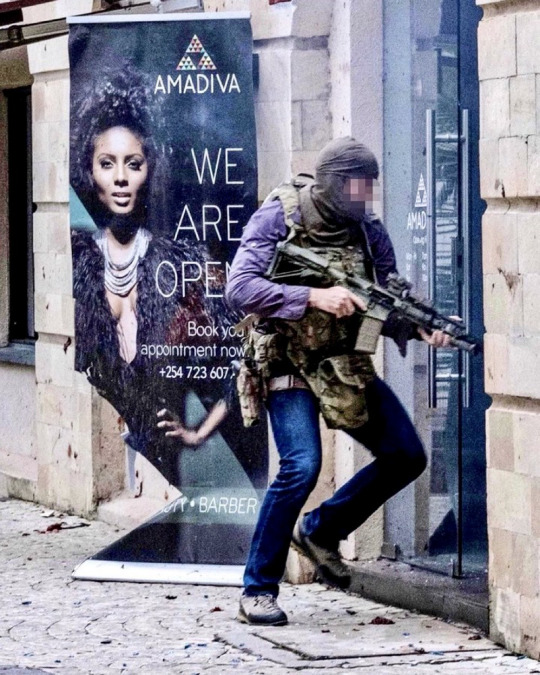
On January 15, 2019, lone SAS operator Christian Craighead enters the Dusit Hotel in Nairobi, Kenya, in respond to a terrorist attack. This famous photograph was seen on social media and major news outlets around the world.
Off-duty at the time, Craighead wore his combat gear over jeans and shirt when he entered the complex alone. He was able escort civilians to safety, then went back inside the hotel where he shot and killed two of the four al-Shabaab gunmen.
(Photo courtesy of AFP/Getty Images)
#christen craighead#sas#british sas#special air service#special forces#nairobi#kenya#terror attack#military#history
313 notes
·
View notes
Text
Breakfast with Giraffes, Girafe Manor hotel, Nairobi, Kenya: Giraffe Manor, where the breakfast table welcomes some very special guests. Giraffes use their 18-inch tongues to grab snacks—sometimes even from your plate.... Giraffe Manor is a hotel in the Lang'ata suburb of Nairobi, Kenya which, together with its associated Giraffe Centre, serves as a home to a number of endangered Rothschild's giraffes, and operates a breeding programme to reintroduce breeding pairs back into the wild to secure the future of the subspecies. Wikipedia
165 notes
·
View notes
Text

Kenyatta International Conference Centre, Nairobi. Karl Henrik Nøstvik.
#brutalism#brutalist architecture#brutalist#interiors#interior#architecture#Karl Henrik Nøstvik#kenya#kenyatta international conference centre#nairobi#africa
1K notes
·
View notes
Text

A young lion looks toward the Nairobi skyline from Nairobi National Park in 2015. Photographed by Tony Karumba.
1K notes
·
View notes
Text

Nairobi, Kenya @ Abdul Hakeem
313 notes
·
View notes
Text






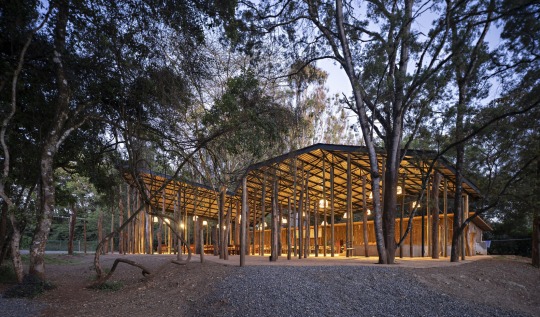





Nairobi Waldorf School, Kenya,
Classrooms are enveloped in wooden logs to harmonize with their forested environment. The project located in forest clearings, features a series of temporary classrooms organized as a “small village” to serve the existing Nairobi Waldorf School.
Construction system was conceived to be adaptable and collaborative, engaging children, parents, and teachers in the process.
Whenever feasible, materials from dismantled classrooms were recycled – wooden floors and walls were transformed into parapets, and roof tiles were repurposed to define path boundaries, among other uses.
The construction materials were chosen for sustainability, including locally sourced red laterite soil from the site excavations for the ‘living walls’ and recyclable polycarbonate for transparency and efficiency
This approach seamlessly blended creativity, sustainability, and community involvement, resulting in a truly unique educational environment.
Courtesy: Urko Sanchez Architects
#art#design#architecture#minimal#nature#interior design#interiors#sustainability#sustainable architecture#school#kenya#recycled#nairobi#education#classroom#urko sanchez architects#village#forest#maasai bomas#hut#manyattas#living wall#polycarbonate#soil#educational architecture
104 notes
·
View notes
Text
"Samuel Onyango’s office at Kibera Primary School is serene and spacious. His table is neatly arranged, with an assortment of files and an array of books. One side of his cream-colored office is decked with aggregate performance scores, and another shows off several trophies in a glass cabinet. Last year, Onyango’s school performed a traditional dance and scooped third place in the National Drama and Film Festivals, where schools across the country competed for the top prize.
But today Onyango, the school’s principal, is bragging about something much more basic: Thanks to an innovative community program, his students and teachers are no longer getting sick from dirty water.
Onyango’s school, with a staff of 30 and a student body of about 1,700, is in Kibera, a neighborhood in the Kenyan capital of Nairobi that is widely known as Africa’s largest informal settlement. It is a community of houses made from mud or tin sheeting where residents have to hustle to meet even their most basic needs, like electricity or clean water.
It is also a community where creativity and innovation, at the heart of any hustle, are changing how some people can access clean water — and making major ripples in public health.
Onyango’s school has long gotten its water the same way many people in Kibera do: by buying it from independent suppliers, who truck water in and sell it for around $30 per 10,000 liters (about 2,650 gallons). But trucked water can be contaminated, despite suppliers’ promises, and Onyango’s students and staff were often using unclean water at home, too. It was common, he says, for both teachers and students to get sick and miss school because of waterborne illnesses.
Last November, Onyango’s school got connected to an aerial clean water system built by a local grassroots organization called SHOFCO, which stands for Shining Hope for Communities. “Once we got connected to SHOFCO’s water,” Onyango says, “cases of these ailments reduced to nil.”
SHOFCO’s water distribution system currently reaches about 40,000 people and distributes more than 3.7 million gallons of clean water per month.
Access to safe drinking water — and its equitable distribution — underpins public health. But for the estimated 250,000 people in Kibera, who live without any government infrastructure, clean water is often a luxury. Many people are using illegal water connections, which proliferate among the poor — there are nearly 130 in just three lesser-resourced Nairobi neighborhoods. But those DIY hookups can mix clean water with raw sewage, and Kenyan officials have recently warned of a looming public health crisis if water access is not prioritized.
Shifting weather patterns also increase the risk of waterborne illness, government officials say. The Ministry of Health and the Kenya Red Cross Society have called out severe flooding during the El Niño weather pattern as a source of a recent major cholera outbreak in parts of the country. Kibera was not spared this risk: The floods led to the contamination of various sources of water in the sprawling neighborhood.
But the aerial piping system SHOFCO built in 2012 — the one that brings water to Onyango’s school — saved some Kibera residents, quite literally. With collaboration from health and county authorities, SHOFCO has all but eliminated diarrheal disease in the communities that use its aerial piping system, according to Gladys Mwende, a program officer at SHOFCO. In the health facilities SHOFCO runs, the incidences of diarrheal infections have also gone down, she adds.

Pictured: People in Kibera’s Makina section pass by the signature blue pillars that hold up SHOFCO’s aerial water piping system. Visual: Sarah Waiswa/Harvard Public Health Magazine
“[Poor sanitation is the reason] that our water is aerial piped,” says Kennedy Odede, the founder and CEO of SHOFCO. Piping water in helps clean water maintain its integrity without interference from elements including tampering. In a huge community with no major infrastructure, piping seemed impossible — there was no money and no will to build a disruptive underground system connected to the city’s main water supply. Instead, Odede and his team put the pipes up in the air. “As somebody who grew up in Kibera, to see this clean water — which I have also drank — is powerful.”
SHOFCO’s water distribution system currently reaches about 40,000 people and distributes more than 3.7 million gallons of clean water per month — nearly 46 million gallons per year — at community water kiosks, which residents access with tokens linked to the mobile money platform M-Pesa. The water kiosks are pre-programmed to fill jerry cans that hold about five gallons at a cost of 3 Kenyan shillings, or about 23 U.S. cents.
A recent evaluation of SHOFCO’s clean water efforts, undertaken by the African Population and Health Research Center, shows diarrheal disease among children under age five have decreased by 31 percent where community members used SHOFCO water kiosks and received SHOFCO’s sanitation messaging.
“We don’t get as many cases of diarrhea even though now we are in the middle of the floods,” Mwende says. “Communities have not reported any outbreaks within the areas where we are working.”
Mohammed Suleiman is grateful for the change. Suleiman, 25, was born here, and it’s been his job for the last 18 years to fetch 135 gallons of water daily for his family’s personal needs and for their samosa business.
Two months ago, Sulieman contracted typhoid from the unsanitary water he was consuming. Once he recovered, he says, switching to SHOFCO water kiosks was a no-brainer.
“I don’t know where the other independent vendors get it from,” he says. But he trusts SHOFCO water. “Water sourced from SHOFCO is cleaner than that of other vendors,” he says. “I don’t have to treat water from [SHOFCO] kiosks before consuming it.”
And he’s the living proof: Since switching to SHOFCO water, Suleiman hasn’t been sick even once."
-via Undark, August 13, 2024
200 notes
·
View notes
Text



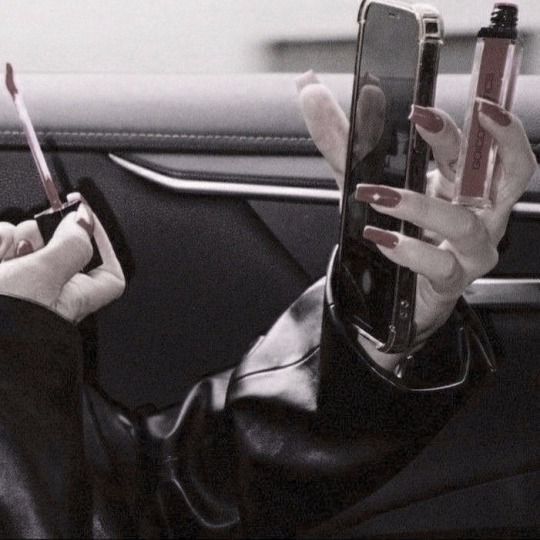
ೃ⁀➷ velvet crowbar ˗ˏˋ꒰ 🦢 ꒱
╰┈➤ berlin x lover!reader headcanons
¡!being berlin’s significant other would include¡!
a/n: i would like to give a special thank you to @lumillsie for the layout of this post and for the filter used on the header!

╰┈➤ berlin is immediately captivated by your appearance. there’s a rare elegance about you, an understated beauty that commands attention without trying. it’s unlike anything he’s encountered, and it draws him in effortlessly, leaving him interested to know more.
╰┈➤ while your beauty enthralls him, it’s your wit and charm that truly ensnare him. you have a way with words, a sharpness to your intellect that leaves him yearning for deeper conversations and a desire to unravel every aspect of who you are. you become an enigma he’s determined to solve.
╰┈➤ berlin’s nature is cold and unyielding, a result of two decades spent in the unforgiving confines of a north korean prison camp. his past is a tightly locked door, one he refuses to open at first. it isn’t a matter of trust, it’s his way of protecting himself from a pain he refuses to relive.
╰┈➤ dating berlin is nothing short of extravagant. he has a taste for the finer things in life, and he spares no expense in showing you that. lavish dinners, exclusive outings, and opulent gifts are all part of the experience. his funds, after all, seem endless, given the spoils of his opulent career.
╰┈➤ at the beginning, berlin is purposefully vague about his work. he deceives his around the truth with charisma and calculated deflections. when he finally reveals his identity, a high-profile criminal and a key member of his brother’s gang, you’re understandably shocked. but your love for him is more potent than your fear. he makes it clear that betrayal is not an option, his warning softened by the lingering heat of a kiss that leaves no room for doubt.
╰┈➤ his jealousy is a force of nature, impossible to contain. when he introduces you to his crew, it’s denver’s passing glances and rio’s inappropriate comments that instantly set him off. but what truly unsettles him is your bond with the professor, his brother. there’s something about how easily you and the professor connect, sharing moments outside of berlin’s presence, that claws away at him. he despises the idea of not being the sole center of your world, his need for control over both you and his relationships simmering beneath his polished exterior.
╰┈➤ berlin insists on having you by his side at all times, your presence a source of grounding and pride for him. though he would never risk your safety by involving you in the criminal work of his team, you are always there, his hand firmly holding yours, or you standing beside him, your hand resting on his shoulder, a quiet gesture of his authority and your loyalty. you speak in his defense or offer support when needed, an unspoken understanding between you both. despite your non-involvement in their activities, berlin bestows upon you your own city codename, kabul. it is a choice made with care, reflecting his regard for you and cementing your place within his world.
╰┈➤ there are instances when berlin’s volatile nature becomes a challenge. his mind, scarred by years of torment and isolation, is not entirely stable. his temper flares, and though his anger can be terrifying, he never directs it to harm you intentionally. when the storm within him finally subsides, he is left stricken with guilt, his apologies sincere as he cups your face, searching for forgiveness in your tear-filled eyes. seeing the hurt he has caused tears at whatever remains of his hardened heart, and he vows to try and control himself for your sake.
╰┈➤ the gang is stunned by your existence. berlin has always been a man of logic and control, a figure immune to sentiment or attachment. yet here you are, the one person who has unraveled him, proving that even he possesses a sliver of humanity buried beneath his cold, calculated exterior. you are his achilles’ heel, the one weakness that could undo him, and yet he clings to you as fiercely as he clings to life itself.
╰┈➤ berlin is unapologetically affectionate toward you, even in front of the other gang members. whether it’s pulling you into his lap during a quiet moment, brushing his fingers over your cheek, or pressing an unabashed kiss to your lips as if no one else exists, his displays of affection are bold and deliberate. he wants everyone to know you belong to him and, more importantly, that he belongs to you.
╰┈➤ as planning for the heist begins, you are present for every discussion and strategy session, a silent observer in the shadows of their grand designs. while you outwardly support berlin, deep down, you are uneasy about the plan’s immense scale and the inevitable danger it poses to him. yet you know berlin too well to argue, once his mind is set, there is no persuading him. all you can do is pray that his brilliance and luck will see him through safely.
╰┈➤ for the professor, your presence is an anomaly he hadn’t accounted for. in his meticulous calculations, you are the crack that threatens to destabilize his perfect plan. before the heist begins, he warns you in no uncertain terms, you are not to contact berlin under any circumstances. when the time comes, you will receive specific instructions, and you are expected to follow them to the letter. but that isn’t enough for you. the thought of being kept apart from berlin, especially in the face of such danger, fills you with dread, and you can’t shake the desperate need to protect him, no matter the cost.

a/n: let me know your thoughts or if you have anymore requests!! also part two to scarface is coming soon!! 🤍

#money heist korea#money heist fanfiction#money heist#money heist fic#money heist fanfic#money heist x reader#money heist imagine#money heist headcanons#money heist professor#money heist berlin#money heist tokyo#berlin#money heist korea berlin#berlin x reader#berlin x female reader#berlin headcanons#berlin fanfiction#berlin fic#berlin fanfic#the professor#professor#tokyo#rio#denver#moscow#oslo#nairobi#park haesoo#park hae soo#la casa de papel
250 notes
·
View notes
Text
Giraffes & Giraffe Manor, Nairobi, Kenya: Woman Shares Breakfast With Giraffes from Hotel Balcony in Nairobi. People enjoyed the lovely interaction between the woman and the giraffes. Giraffe Manor is a 5-star hotel in Nairobi, Kenya. Nairobi is the capital and largest city of Kenya. The city is commonly referred to as The Green City in the Sun. Wikipedia
484 notes
·
View notes
